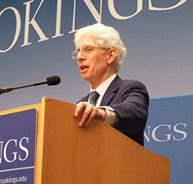William A. Galston

In his weekly Politics & Ideas column in the Wall Street Journal, political theorist and writer William A. Galston has explored viewpoints on topics ranging from President Barack Obama's foreign policy challenges in the Middle East and Ukraine, inflation and U.S. economic growth, and social security and the standard of living for future generations.
On Monday, Sept. 29, the Hobart and William Smith President's Forum Series welcomed Galston, the Ezra Zilkha Chair at the Brookings Institution's Governance Studies Program, where he serves as a senior fellow. The talk titled "America's Polarized Politics: Where does it come from, and what can we do about it?" began at 7:30 p.m. in the Vandervort Room of the Scandling Campus Center.
A former policy adviser to President Bill Clinton and to six presidential campaigns, Galston is an expert on domestic policy, political campaigns, and elections. His current research focuses on designing a new social contract and the implications of political polarization.
At the University of Maryland, Galston serves as the College Park Professor and was the Saul Stern Professor at the School of Public Policy. In addition, he has served as director of the Institute for Philosophy and Public Policy, and as founding director of the Center for Information and Research on Civic Learning and Engagement.
The author of eight books and more than 100 articles in the fields of political theory, public policy, and American politics, Galston's most recent books are "Liberal Pluralism" (Cambridge, 2002), "The Practice of Liberal Pluralism" (Cambridge, 2004), and "Public Matters" (Rowman & Littlefield, 2005). A winner of the American Political Science Association's Hubert H. Humphrey Award, he was elected a Fellow of the American Academy of Arts and Sciences in 2004.
Galston served as a sergeant in the U.S. Marine Corps and holds a Ph.D. from the University of Chicago. He has appeared on all the principal television networks and is a frequent commentator on NPR.
This information is accurate for the time period that this person(s) spoke at Hobart and William Smith.
